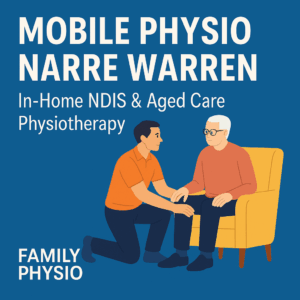Introduction
Finding a reliable NDIS physiotherapy provider in Melbourne that matches your specific needs can significantly impact your journey towards achieving personal health goals.
At FamilyPhysio, we understand the importance of selecting an NDIS approved physiotherapist who not only meets your expectations but also supports your aspirations for a healthier, more active lifestyle.
This guide aims to simplify the process, ensuring you make an informed decision tailored to your unique requirements.

Understanding Your Physiotherapy Needs and Goals
The foundation of a successful NDIS physiotherapy experience lies in a clear understanding of your own needs and goals. Begin by assessing:
- Specific Needs: Identify your primary reasons for seeking physiotherapy. Are you looking to improve mobility, manage chronic pain, recover from an injury, or enhance your physical capabilities?
Understanding the specific outcomes you wish to achieve helps in filtering providers based on the services they offer.
- Long-term Goals: Think beyond immediate needs to your long-term aspirations. Are you aiming to achieve a certain level of independence, participate in specific activities, or improve your overall quality of life? Knowing your long-term goals allows you to discuss potential pathways and strategies with your provider.
- Preferences and Requirements: Consider any personal preferences or requirements you may have, such as a provider with experience in working with clients with similar conditions, cultural and linguistic needs, or specific gender preferences for your therapist.
Researching Potential NDIS Physio Providers
With your needs and goals outlined, the next step is to compile a list of potential providers. Effective research strategies include:
- NDIS Website: Start with the official NDIS provider finder tool to locate registered physiotherapy providers in Melbourne. Registered providers meet the NDIS quality and safety requirements, offering a level of trust and assurance.
- Recommendations: Personal recommendations from friends, family, or healthcare professionals can be invaluable. Hearing about others’ experiences provides insights that aren’t always visible through official channels.
- Online Reviews and Forums: Websites, social media, and forums dedicated to disability support and physiotherapy services can offer real-world feedback on various providers.
Evaluating Credentials and Experience
Assessing the credentials and experience of potential providers is critical. Key factors to consider include:
- NDIS Registration: Confirmation of NDIS registration is a basic requirement, ensuring the provider meets certain standards.
- Qualifications and Specializations: Look for providers with the necessary academic qualifications in physiotherapy, as well as any specializations relevant to your needs.
- Experience: Consider the provider’s experience, especially with clients who have similar conditions or goals. Experienced providers can offer nuanced care and insights that newer practitioners may not.
Assessing Service Offerings
A detailed assessment of the services offered by each provider will help you understand if they can meet your specific needs. Important aspects to consider are:
- Range of Services: Does the provider offer a wide range of physiotherapy services, including the specific types of therapy you require?
- Specialized Support: If you have unique needs (e.g., neurological rehabilitation, pediatric physiotherapy, or sports injury recovery), ensure the provider has experience and success in these areas.
- Accessibility and Convenience: Consider the ease of accessing the provider’s services, including location, home visit options, and telehealth services.

Considering Reputation and Client Feedback
A provider’s reputation and feedback from past or current clients can offer valuable insights into the quality of care and service you can expect. Research through:
- Testimonials and Reviews: Look for testimonials on the provider’s website and reviews on independent platforms.
- Social Media and Online Forums: Social media channels and online forums can provide unsolicited feedback and discussions about providers.
Understanding Costs and Funding
Navigating the costs and funding options is a crucial step in selecting your NDIS physiotherapy provider. Important considerations include:
- Transparency: Providers should be upfront about their fees and how they align with NDIS pricing guidelines.
- NDIS Plan Compatibility: Ensure the provider’s billing practices are compatible with your NDIS plan type (self-managed, plan-managed, or NDIA-managed).
Accessibility and Location
The physical accessibility of your provider plays a significant role in your therapy journey. Factors to evaluate include:
- Location Proximity: Consider how close the provider is to your home or work, making regular visits more feasible.
- Transport Options: Check if the provider is easily accessible by public transport or has adequate parking facilities.
- Home Visits and Telehealth: For those with significant mobility challenges, providers offering home visits or telehealth services can be a game-changer.
Meeting with Potential Providers
Meeting potential providers allows you to ask questions and gauge whether they’re a good fit for your needs. Prepare a list of questions such as:
- How do you customize therapy plans for individual clients?
- Can you share success stories or case studies of clients with similar needs to mine?
- How do you measure and track progress?
Reviewing Policies and Agreements
Understanding a provider’s policies and service agreements is essential before making your decision. Pay attention to:
- Service Agreements: Look for clear, understandable service agreements that outline the services, costs, and terms of engagement.
- Cancellation Policies: Understand the provider’s policies regarding appointment cancellations and rescheduling.
- Privacy and Confidentiality: Ensure your personal information will be handled with the utmost confidentiality and security.
Trusting Your Instincts
Finally, it’s important to trust your instincts. After meeting with potential providers and considering all the information, trust your feelings about which provider feels like the best fit for you. The right provider should make you feel comfortable, understood, and confident in your care.
Key Considerations for Selecting an NDIS Physiotherapy Provider
Consideration | Description | Why It’s Important |
Credentials and Experience | Ensure the provider is registered with the NDIS and has relevant physiotherapy qualifications and experience. | Verifying credentials and experience ensures the provider is qualified to offer safe and effective physiotherapy services tailored to your specific needs. |
Service Offerings | Assess whether the provider offers the specific physiotherapy services you require, such as rehabilitation, pain management, or mobility enhancement. | Finding a provider that offers the services you need ensures your physiotherapy goals can be effectively met. |
Cost and Funding | Understand the provider’s pricing structure and how it aligns with your NDIS plan. Look for transparency and flexibility in billing arrangements. | Ensuring the cost of services fits within your budget and NDIS plan prevents financial strain and allows for continuous access to necessary physiotherapy services. |
Location and Accessibility | Consider the provider’s location and how easily you can access their facilities or whether they offer home visits or remote consultations. | Choosing a conveniently located provider or one that offers flexible service delivery options ensures ease of access to physiotherapy sessions. |
Reputation and Client Feedback | Research the provider’s reputation through online reviews, testimonials, and feedback from current or past clients. | A positive reputation and good feedback from clients indicate a high level of satisfaction with the provider’s services, suggesting they are a reliable choice. |
FAQs for Choosing the Right NDIS Physiotherapy
The National Disability Insurance Scheme (NDIS) is a funding scheme designed to support Australians with a disability, including providing access to necessary services such as physiotherapy.
It helps cover the cost of services that support participants’ health and well-being, enabling them to achieve their personal goals.
NDIS approved providers are registered with the NDIS and meet strict quality and safety requirements.
You can verify a provider’s NDIS approval by checking the official NDIS website or asking the provider directly for their registration details.
Key considerations include the provider’s credentials and experience, the range of services offered, compatibility with your NDIS plan in terms of cost and funding, the provider’s location and accessibility, and their reputation and feedback from other clients.
Yes, you have the right to change your NDIS physiotherapy provider if you feel that your needs are not being met or if you believe another provider could offer better support. It’s important to communicate your concerns with your current provider first, but if issues cannot be resolved, you can look for another provider.
Yes, many physiotherapy providers specialize in specific areas of care, such as pediatric physiotherapy, neurological rehabilitation, sports injury recovery, and more.
When researching providers, look for those with experience and qualifications in the area that matches your needs.
Conclusion
Selecting the right NDIS physiotherapy provider in Melbourne involves thorough research, careful consideration of your needs and goals, and a bit of intuition.
By taking the time to understand what you need, researching potential providers, and evaluating their offerings against your criteria, you can find a provider that will support you in achieving your health and wellness objectives.
Contact Us
At FamilyPhysio, we’re committed to providing personalized, high-quality physiotherapy services to our NDIS clients. Contact us today to learn more about how we can support your journey towards better health and independence.




